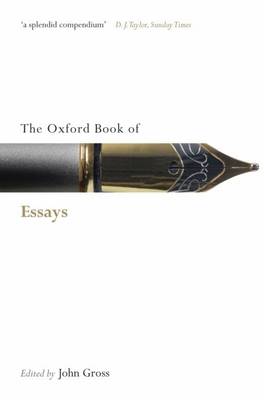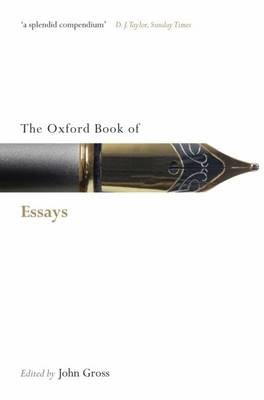
Bedankt voor het vertrouwen het afgelopen jaar! Om jou te bedanken bieden we GRATIS verzending aan op alles gedurende de hele maand januari.
- Afhalen na 1 uur in een winkel met voorraad
- Gratis thuislevering in België
- Ruim aanbod met 7 miljoen producten
Bedankt voor het vertrouwen het afgelopen jaar! Om jou te bedanken bieden we GRATIS verzending aan op alles gedurende de hele maand januari.
- Afhalen na 1 uur in een winkel met voorraad
- Gratis thuislevering in België
- Ruim aanbod met 7 miljoen producten
Zoeken
Omschrijving
The essay is one of the richest of literary forms. Its most obvious characteristics are freedom, informality, and the personal touch--though it can also find room for poetry, satire, fantasy, and sustained argument. All these qualities, and many others, are on display in The Oxford Book of Essays. The most wide-ranging collection of its kind to appear for many years, it includes 140 essays by 120 writers: classics, curiosities, meditations, diversions, old favorites, recent examples that deserve to be better known. A particularly welcome feature is the amount of space allotted to American essayists, from Benjamin Franklin to John Updike and beyond. This is an anthology that opens with wise words about the nature of truth, and closes with a consideration of the novels of Judith Krantz. Some of the other topics discussed in its pages are anger, pleasure, Gandhi, Beau Brummell, wasps, party-going, gangsters, plumbers, Beethoven, potato crisps, the importance of being the right size, and the demolition of Westminster Abbey. It contains some of the most eloquent writing in English, and some of the most entertaining.
Specificaties
Betrokkenen
- Auteur(s):
- Uitgeverij:
Inhoud
- Aantal bladzijden:
- 704
- Taal:
- Engels
- Reeks:
Eigenschappen
- Productcode (EAN):
- 9780199556557
- Verschijningsdatum:
- 15/12/2008
- Uitvoering:
- Paperback
- Formaat:
- Trade paperback (VS)
- Afmetingen:
- 127 mm x 193 mm
- Gewicht:
- 498 g

Alleen bij Standaard Boekhandel
Beoordelingen
We publiceren alleen reviews die voldoen aan de voorwaarden voor reviews. Bekijk onze voorwaarden voor reviews.












